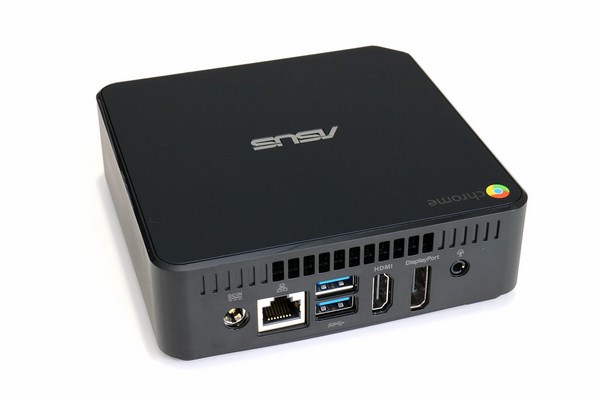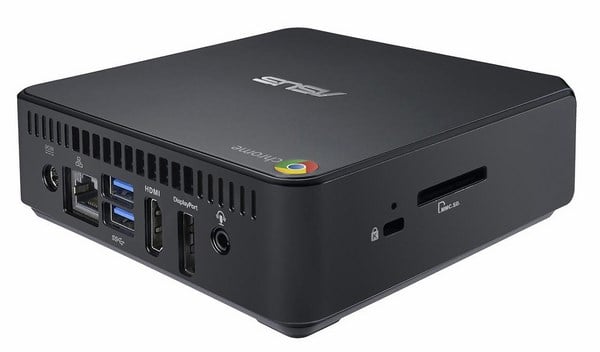The ASUS Chromebox is built on a diminutive 5-inch square platform that is sheathed in flat black, matte-finished plastic. It's not particularly high quality in terms of feel nor does it feel flimsy
per se; it just gets the job done in a very low-profile, out-of-sight-out-of-mind sort of way. In many ways, the chromebox is the "new thin client," offering a capable computing experience in a no-nonsense, cost-first solution.

The good news is, unlike many previous thin client solutions, you can expand on this Chromebox's somewhat light storage offering with the help of both a microSD card slot and 100GB of free Google Drive storage for 2 years.

You also get the latest in connectivity options here with two USB 3.0 ports on the rear of the device and two on the front, along with HDMI and DisplayPort output, 802.11n WiFi connectivity, and wired 10/100/1000 Gigabit Ethernet. It would have been nice to have Intel's latest 802.11ac MIMO radio technology on board, but in practice we found WiFi performance to be actually pretty robust with the system, streaming 4K video trailers with ease with a reasonable amount of range as well.


ASUS doesn't bundle their wireless Chrome keyboard and mouse with all Chromebox systems, but our Core i3-based unit (model number M025U) comes with both of these standard. The keyboard is actually pretty nice, and though it's quite light weight and easy to handle, it provides a roomy layout, good tactile response, and decent key travel. It actually serves well as a browsing keyboard but we wish there we a few more multimedia controls beyond just the volume, mute, and full screen mode buttons. Play, fast-forward, rewind, pause, and stop would be great, for starters.

One of the nicest features of the ASUS Chromebox is how easy it is to service, at least for the components of the system that are serviceable. Though Intel's Core i3 ULT series processors are a soldered-down affair, you can upgrade the system's DDR3 memory to as much as 16GB. Its SATA Express Flash SSD can be upgraded as well, and though it's a bit more nebulous, you could also try an Intel Wireless-AC 7260 Bluetooth combo Mini PCI Express card upgrade down the road. (A quick search on Google Groups does suggest it is supported in the current Chrome OS kernel release).

When you consider what ASUS was able to pack into the Chromebox M025U, there are really few compromises made for its form factor. Again, more storage would be nice, but when you consider the entire ecosystem model of the device is connected computing, you can begin to justify the need for external storage expansion via SD card or USB by factoring in the relative cost of the system versus similar devices with larger SSDs or HDDs.









